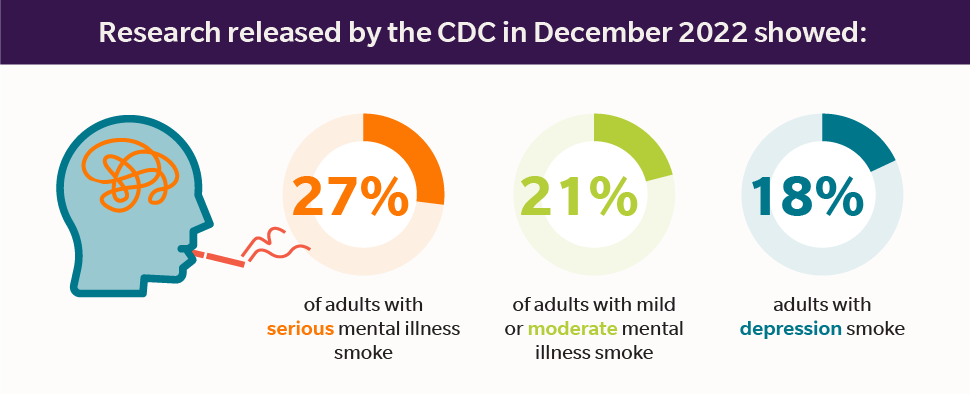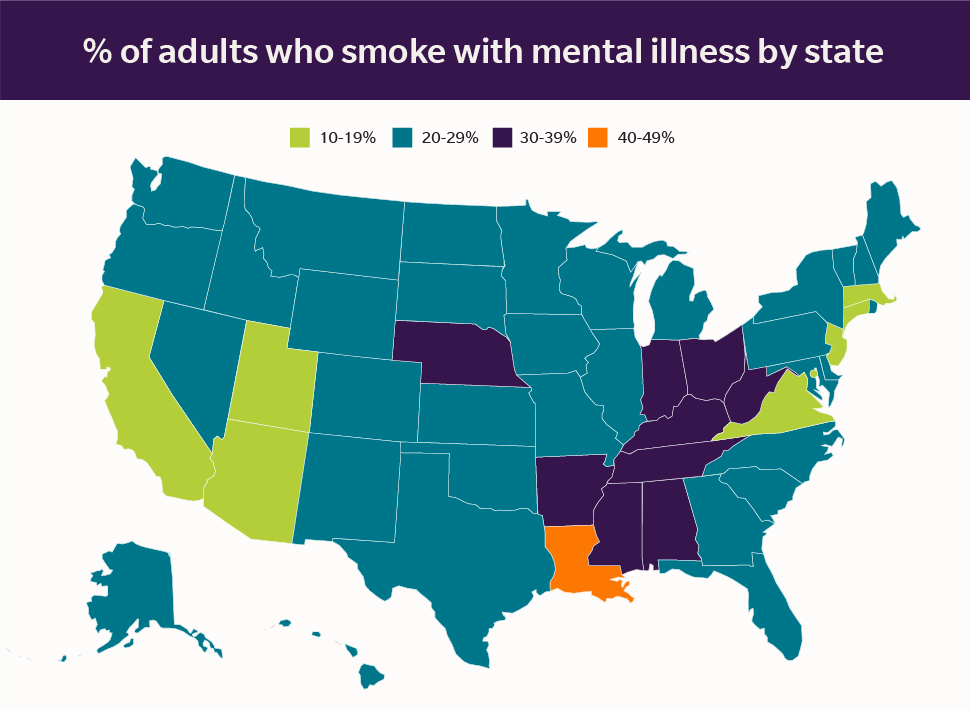Easy access to therapists, telehealth, and remote work options are expected benefits nowadays for employee mental health support. But there is one benefit that can give employee mental health a significant boost…and you likely aren’t using it.
It’s a program that actively engages employees in quitting all forms of tobacco.
Connection between Mental Health and Smoking
About 1 in 5 U.S. adults has a mental health condition. These same individuals are more likely to smoke cigarettes than the population overall.
Research released by the CDC in December 2022 showed:
- 27% of adults with serious mental illness smoke
- 21% of adults with mild or moderate mental illness smoke
- 18% of adults with depression smoke
Unsurprisingly, states with the highest smoking rates overall also have the highest rates of smoking among people with mental illness. State-level smoking prevalence among adults with any mental illness ranged from 12% in Utah to 42% in Louisiana, with a median of 25%.
There are a variety of reasons, including lack of access to tobacco cessation services, myths about how tobacco products affect mental health, and misconceptions about people with mental illness who smoke.
Connection between Mental Health and Vaping
Although some people may believe that vaping is a safe way to use tobacco, there are troubling links between vaping nicotine and mental health.
Current e-cigarette users have double the odds of having a diagnosis of depression compared to those who have never vaped.
According to a JAMA study of nearly 30,000 current e-cigarette users above age 18, frequent vaping is associated with higher odds – 2.4X – of having a diagnosis of depression compared to never users.
Impact of Quitting on Mental Health
People who use tobacco go through multiple cycles of nicotine withdrawal every day. This creates a rollercoaster effect of feeling “hangry” for nicotine (irritable, distracted, fidgety, headache, nausea, etc.) followed by relief of those symptoms.
Those ups and downs take a real toll on overall mental wellbeing when they happen day after day, month after month. These long-term effects are serious, so much so that continued smoking is associated with higher levels of anxiety and depression.
The good news is that helping people quit tobacco can actually have a positive impact on their mental health. In fact, quitting smoking is associated with reduced depression, anxiety, and stress.
Yes, People with Mental Illness Want to Quit Tobacco
Think people with a mental illness who smoke don’t really want to quit? Or that their mental health issues are too big a challenge to be able to quit successfully? That’s another misconception.
Among a sample of adults who smoked and were hospitalized with mental illness, almost 2 out of 3 participants were interested in quitting. This suggests that adults who smoke and have mental illness are motivated to quit.
And for people with mental illness, quitting tobacco is not only possible but one of the best things that these individuals can do for their overall wellbeing.
What Employers Can Do
Today, providing comprehensive employee mental health support also means reducing barriers to access an evidence-based program for tobacco addiction.
To do this, it requires that your organization:
- Offers a robust quit-tobacco solution that effectively engages tobacco users in quitting.
- Uses a proven solution that helps build the skills and confidence people need to successfully quit.
- Applies an integrated approach across your benefits to ensure your mental health vendor knows about your quit-tobacco program and vice versa to refer employees in need.
At the EX Program, we offer all of this and more.
To see how our effective solutions for tobacco addiction can support employee mental, physical, and financial health initiatives, please contact us today.








